Heating Repair Services – Atlanta, GA
Top Signs Your Heating System Needs Professional Attention Before Winter Starts
As winter approaches, your heating system’s health becomes crucial. Catching issues early can save you from sudden breakdowns and expensive repairs. Here are the top signs that your heating system needs professional attention before winter sets in:
1. Uneven Heating in Your Home
If some rooms are warmer than others or certain areas of your home feel unusually cold, it may indicate a problem with your heating system. Uneven heating could result from clogged filters, ductwork issues, or a failing furnace blower. Addressing these problems early by scheduling heating and air conditioning repair near me can help restore comfort and prevent further wear on your system.
2. Unusual Noises from the Heater
Banging, rattling, or squealing sounds aren’t just annoying—they’re signs that your heating system needs attention. Unusual sounds may indicate loose parts, motor issues, or worn-out belts. Ignoring these noises can worsen the problem, potentially leading to a full system breakdown. Scheduling a visit with trusted HVAC repair services can identify and resolve these issues promptly.
3. Increased Energy Bills
If your energy bills are significantly higher than usual without a noticeable change in usage, your heating system might be working harder to provide the same level of warmth. Inefficient heating could stem from leaks, outdated components, or neglected maintenance. A professional HVAC technician can identify efficiency issues and make repairs that bring energy costs back under control.
4. Constantly Running System
A heater that doesn’t turn off or cycles on and off more frequently than normal could signal thermostat problems or mechanical issues. This constant cycling stresses the system, shortening its lifespan. If you’re experiencing these symptoms, contact heating and air conditioning repair near me to have a technician evaluate and fix the issue before it turns into a more extensive repair.
5. Yellow Pilot Light or Unusual Smells
A yellow pilot light, instead of the usual blue, often indicates improper gas combustion, which can lead to carbon monoxide buildup—a serious safety concern. If you detect unusual odors like burning, dust, or gas, it’s essential to shut off the system and contact an HVAC professional immediately. They can perform a safety inspection and make necessary repairs, ensuring your system operates safely.
6. Poor Air Quality and Increased Dust
If you notice a rise in dust or if the air feels stale, it may be due to clogged filters or a failing blower. Clean air filters and a well-maintained system improve indoor air quality, making your home more comfortable and reducing respiratory irritants. Preventative maintenance and timely HVAC repair services can help keep your system clean and your air healthier. Regular AC repair and maintenance is also essential to ensure that your air conditioning unit runs efficiently, contributing to a healthier indoor environment.
7. System Age and Past Repairs
If your heating system is older than 10–15 years, it may be nearing the end of its lifespan. Frequent repairs or recurring issues might mean it’s time to consider a replacement. An HVAC technician can evaluate whether repairing or upgrading your system is more cost-effective in the long run.
Taking these signs seriously and investing in heating and air conditioning repair near me can prevent costly and inconvenient breakdowns in the middle of winter. Addressing potential issues now ensures your home stays warm and comfortable all season.
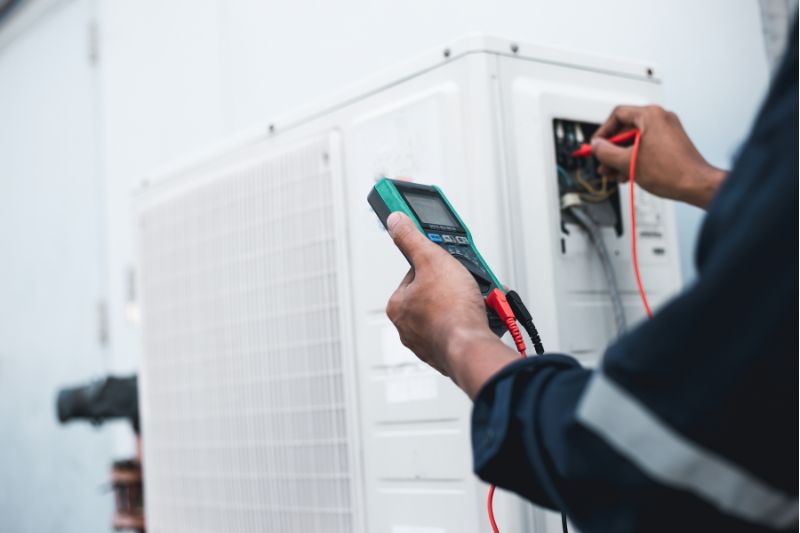
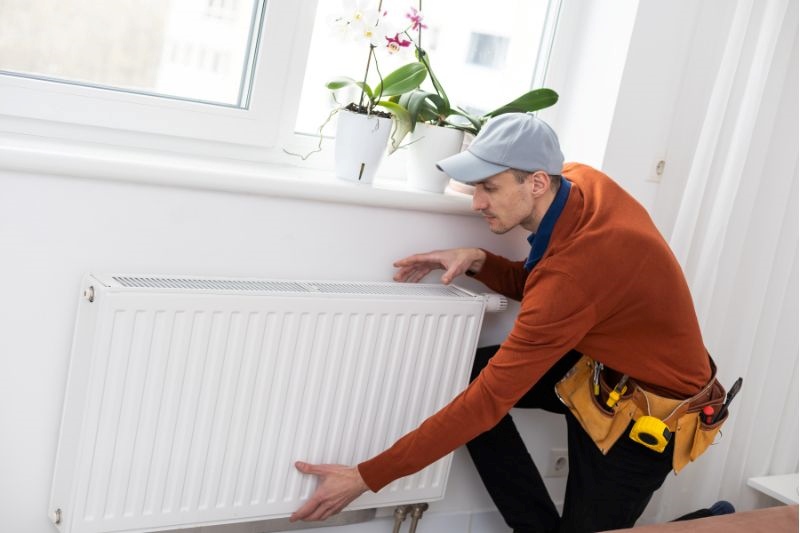
Got Questions? Call Now To Get Answers
DIY Heating Maintenance Tips to Extend the Life of Your Heater
Regular maintenance is key to keeping your heater running efficiently and extending its lifespan. While some tasks are best left to professionals, there are a few DIY heating maintenance tips that any homeowner can perform to improve their heating system’s performance. Here are some essential steps to get the most out of your heater and avoid unexpected breakdowns, saving you time and money on repairs.
1. Replace or Clean the Air Filter
One of the easiest yet most effective ways to maintain your heating system is to replace or clean the air filter regularly. A clogged filter reduces airflow, making your heater work harder and decreasing its efficiency. Replacing the filter every 1–3 months, especially during peak use, keeps your system efficient and helps reduce the likelihood of needing emergency 24/7 HVAC repair in the winter.
2. Inspect and Clean Vents and Ducts
Dust and debris can accumulate in vents and ducts, restricting airflow and putting strain on your heating system. You can vacuum the vent covers and clean around duct openings to maintain airflow and indoor air quality. For more thorough cleaning, consider professional services, as clear ducts also contribute to better performance when switching to cooling during air conditioning repair season.
3. Check the Thermostat Settings
Ensuring your thermostat is set to the ideal temperature and functioning correctly can prevent unnecessary wear on your heater. Test your thermostat by setting it to a higher temperature and making sure the heater responds appropriately. Consider upgrading to a programmable thermostat, which can reduce energy consumption by adjusting temperatures automatically based on your schedule.
4. Inspect Your System for Strange Sounds or Smells
If you hear banging, rattling, or screeching noises, or if you notice unusual smells, your heater may need attention. Unusual sounds could signal loose parts, while odd smells may indicate problems such as burnt wiring or gas leaks. While DIY maintenance can address some issues, persistent noises or smells should be examined by a 24/7 HVAC repair technician, as they may signify more serious underlying problems.
5. Keep the Area Around the Heater Clear
Ensure that the area surrounding your heater is free of clutter, debris, or flammable materials. Good airflow around your heating unit prevents overheating and helps the system work more effectively. By keeping the space clear, you’ll help your heater avoid operational stress and potential safety hazards.
6. Seal and Insulate Windows and Doors
A well-sealed home helps maintain a stable temperature, reducing the workload on your heating system. Check for drafts around doors and windows, and apply weatherstripping or caulking to seal any gaps. This minimizes the amount of work your heater has to do, ultimately extending its lifespan and saving on heating costs.
7. Test the Pilot Light and Check Gas Connections
For gas-powered heaters, inspect the pilot light to ensure it’s a steady blue flame. A yellow or flickering pilot light could indicate a ventilation issue or incomplete gas combustion. If you’re comfortable doing so, inspect your gas connections to make sure they’re tight and leak-free. If there’s any doubt, call a professional for air conditioning repair or heating repair to ensure your safety.
8. Schedule an Annual Professional Inspection
While DIY maintenance is beneficial, an annual inspection by a professional HVAC technician is essential. A professional can spot issues that may not be visible during your routine maintenance and can make adjustments to ensure your system operates smoothly. Many 24/7 HVAC repair services offer maintenance plans that include an annual inspection and tune-up to help keep your system in optimal shape year-round.
9. Turn Off the System Before Cleaning or Inspecting
When performing any maintenance, remember to turn off the heater entirely. This protects you from accidental burns or shocks and ensures the safety of any components you may be working around. For tasks such as cleaning the burner, only attempt this if you feel confident and understand the process, as incorrect handling can lead to damage or even carbon monoxide leaks.
With regular DIY care and preventive measures, you can help extend the life of your heater and reduce the risk of breakdowns. However, for major issues or unexpected emergencies, reach out to 24/7 HVAC repair services to ensure your system is well taken care of. Simple DIY maintenance, combined with professional care, provides a more reliable and efficient heating experience for years to come.
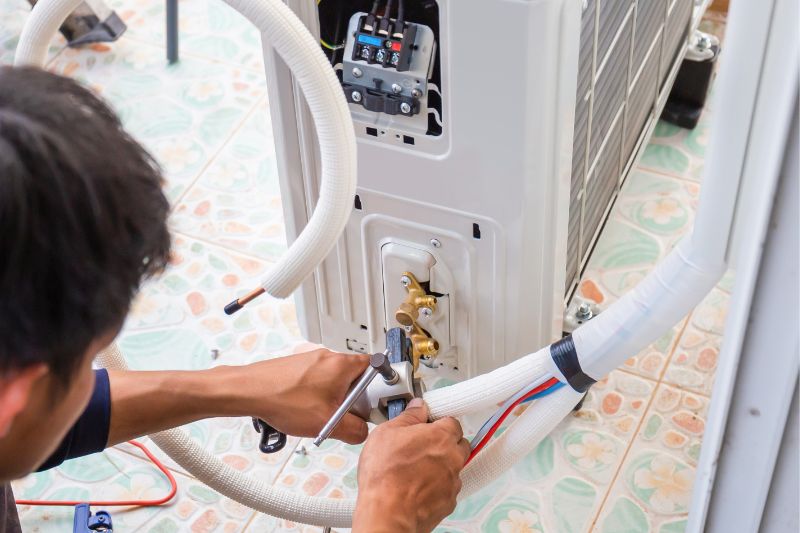
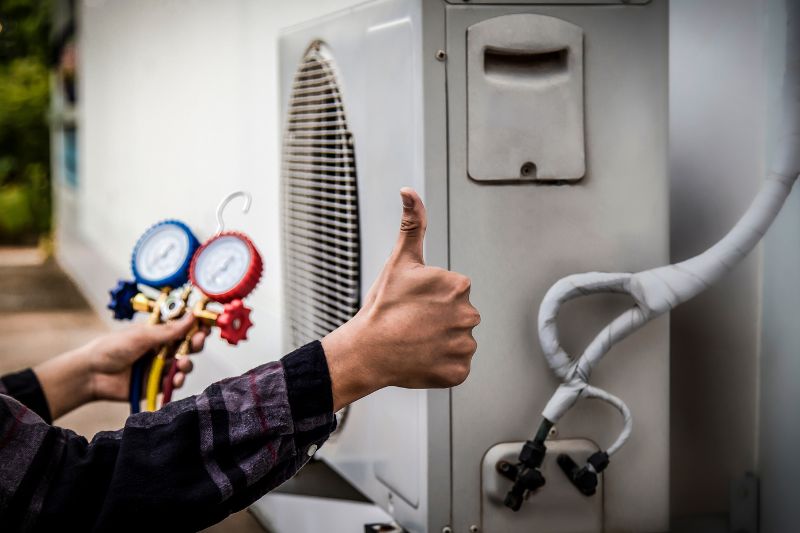
Got Questions? Call Now To Get Answers
Gas vs. Electric Heaters: Which One Is Easier and Cheaper to Repair?
When it comes to maintaining and repairing heating systems, one of the key questions homeowners face is whether gas or electric heaters are more cost-effective and easier to repair. Both types have unique characteristics, maintenance needs, and repair costs. Understanding these differences can help you make an informed decision about which heating system might be better for your home and budget. Here’s a breakdown to help you choose between gas and electric heaters, and how to keep repair costs manageable with affordable HVAC services.
1. Initial Costs of Gas vs. Electric Heaters
Generally, gas heaters have a higher upfront installation cost compared to electric heaters due to the need for specialized gas connections and ventilation systems. However, they are often more efficient in colder climates, making them popular in regions with long winters. Electric heaters are typically cheaper to install and are often chosen for smaller homes or warmer climates where they don’t need to work as intensively.
2. Frequency of Repairs
Gas heaters often require more frequent repairs than electric ones. This is because gas heaters have more components and require venting systems to manage gas emissions. Parts like pilot lights, burners, and heat exchangers in gas systems are more prone to wear and tear and may need regular maintenance.
Electric heaters, on the other hand, have simpler mechanisms and fewer moving parts, which usually results in fewer repair needs. Most electric systems are designed to be low-maintenance, so they typically last longer without the need for service. This is a point to consider if you’re looking for a system that will require less frequent attention from affordable HVAC services.
3. Cost of Repairs
When repairs are needed, gas heaters can be more expensive to fix. Repairs for gas systems often involve specialized parts and labor due to the safety concerns associated with handling gas lines and combustion components. For example, repairing a faulty heat exchanger or gas valve may require significant expense. Additionally, certain components of gas heaters, such as the pilot light or ignition systems, can incur higher repair costs due to safety requirements.
Electric heater repairs, in contrast, are generally simpler and cheaper. Electric heaters don’t require complex combustion mechanisms, and many repairs, such as fixing thermostats or heating elements, are typically straightforward. For this reason, electric systems are often seen as easier to maintain, especially when opting for affordable HVAC services to keep costs down.
4. Energy Efficiency and Operating Costs
While gas heaters are often more energy-efficient, particularly in cold climates, their efficiency comes with higher operational costs for natural gas or propane fuel. Electric heaters might have lower fuel costs but may use more electricity in colder weather, making their operating expenses higher in some regions.
Homeowners should consider local energy prices and their climate to determine which option may be more affordable in the long run. Electric heaters may be better in milder climates with moderate winters, while gas heaters tend to be more cost-effective in regions with prolonged cold weather.
5. Safety and Repair Complexity
Gas heaters require careful maintenance to avoid risks like carbon monoxide leaks, which makes regular professional servicing essential. Repairs for gas systems can be more complex due to the need to handle fuel lines and monitor combustion safety, which is why certified technicians are usually required.
Electric heaters, by contrast, have fewer safety concerns since they don’t produce emissions or require fuel. This simplicity makes electric heater repairs less complex, so you may find affordable HVAC services that can quickly manage repairs without the added risk factors associated with gas.
6. Longevity and Replacement Costs
Both gas and electric heaters have expected lifespans, but electric heaters often last longer due to their simpler components and reduced wear from combustion. Gas heaters typically last around 10–20 years, while electric heaters can sometimes last over 20 years if well-maintained. However, the decision to repair versus replace also depends on the type of heater. For older gas units, replacing rather than repairing may be more economical, especially as technology advances and new models become more efficient.
7. Choosing the Right System for Your Home
If you’re looking for ease of maintenance and lower repair frequency, an electric heater could be the way to go. For those living in colder regions where heating needs are substantial, a gas heater may be a better choice in terms of operating efficiency, though repair costs can be higher.
Both gas and electric heaters have their pros and cons when it comes to repair needs and costs. Working with affordable HVAC services ensures that whichever type of system you choose, you have access to skilled professionals who can keep your heating system running smoothly all winter long. Whether you’re facing simple maintenance tasks or more complex repairs, knowing the characteristics of each system can help you budget effectively and make informed choices for your home heating needs.
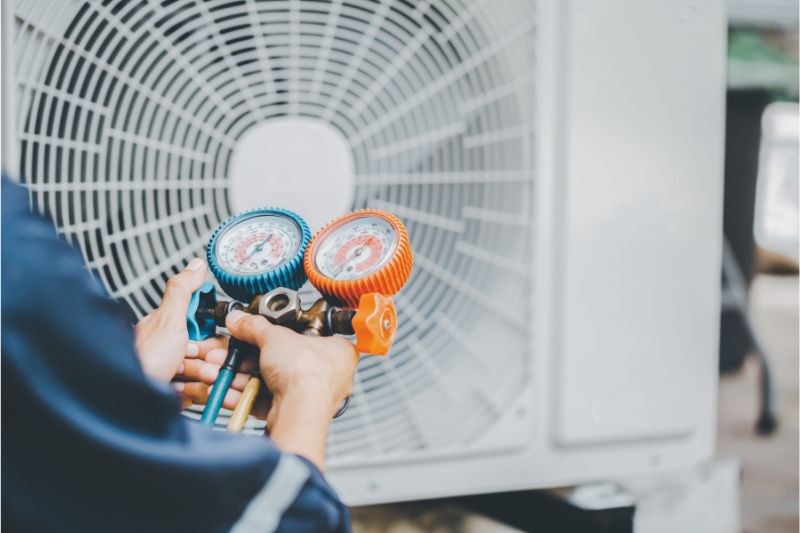
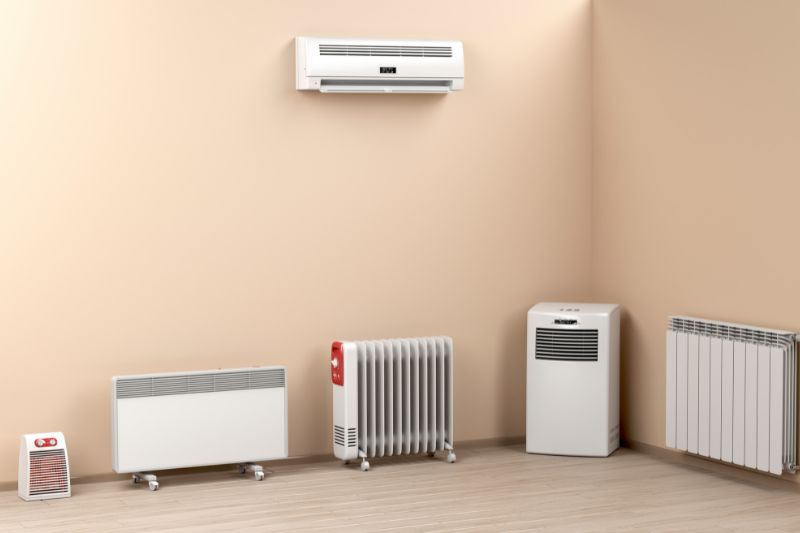
Got Questions? Call Now To Get Answers
Why Your Heater Smells Strange: Identifying Common Odors and What They Mean
Strange smells from your heater can be alarming, and they often indicate an issue that needs attention. Identifying the type of odor coming from your heating system can help you understand what’s wrong and whether immediate action is required. Here’s a breakdown of some common heater odors, what they typically mean, and when to seek help from an HVAC professional.
1. Burning Dust Smell
Description: When you turn on your heater for the first time in months, it may produce a burning dust smell.
Cause: This smell usually occurs because dust has accumulated on the heater’s components, such as the heat exchanger or electric coils, during the off-season. When the system heats up, it burns off this dust, causing a mild burning smell.
Solution: This odor is usually harmless and should dissipate within a few hours of operation. However, if the smell persists, it could mean there’s a larger buildup of debris, and a heating repair services provider might need to inspect and clean your system.
2. Moldy or Musty Smell
Description: A damp, musty smell coming from your heater might remind you of mildew or mold.
Cause: Moisture can build up within your HVAC system, especially if the condensate drain is clogged or if you have a humid environment. This moisture creates an ideal environment for mold and mildew growth, which can cause respiratory issues if left untreated.
Solution: Check for visible water leaks around the heater and ensure that vents and filters are clean. Mold growth within the HVAC system requires professional cleaning to prevent health risks. This might be an ideal situation to call emergency HVAC repair to prevent further mold spread.
3. Electrical or Metallic Burning Smell
Description: If you detect a hot, metallic, or electrical burning smell, it’s likely a sign of overheating electrical components.
Cause: This odor can be due to malfunctioning parts, such as a blower motor or a wiring issue within the heating unit. Electrical issues can also occur if parts are loose or the motor is strained, causing components to overheat.
Solution: Turn off your heater immediately and call a professional. Electrical issues pose a fire hazard and should only be handled by a qualified HVAC technician. Heating repair services can inspect and replace faulty components to prevent further risks.
4. Rotten Egg or Sulfur Smell
Description: A rotten egg smell is unmistakable and should never be ignored.
Cause: This odor is often associated with a natural gas leak. Natural gas is odorless on its own, but gas companies add a sulfur-like smell to help detect leaks. If you’re using a gas furnace, this odor indicates a potential gas leak, which can lead to fires or explosions.
Solution: Immediately turn off the heater and any other open flames, evacuate your home, and contact your gas company or emergency services. Once the leak is fixed, an HVAC professional can inspect your system to ensure it’s safe to operate.
5. Burning Plastic or Chemical Smell
Description: A smell like burning plastic or chemicals could mean something is overheating or burning within the system.
Cause: Plastic smells may indicate that foreign objects, like toys or debris, have fallen into the ductwork and are overheating. Additionally, it could be a sign that the insulation on wiring is burning due to overheating components or wiring problems.
Solution: Turn off your heater and check for any visible foreign objects in vents. If you can’t find the source, contact an HVAC technician for a full inspection. Ignoring this odor can lead to fire hazards, so it’s best to address it as soon as possible.
6. Oil or Smoky Smell
Description: If you have an oil furnace and notice an oily or smoky smell, it could signal an oil leak or a clogged burner.
Cause: Oil smells often stem from issues within the furnace’s filter or combustion chamber. A clogged or malfunctioning burner can lead to incomplete combustion, causing the oil smell to linger.
Solution: Oil furnaces require regular maintenance to prevent these odors and other issues. If you detect an oily smell, turn off the furnace and contact a professional to prevent the situation from worsening.
7. Damp Sock or “Dirty Sock” Syndrome
Description: Named for its distinct smell, “dirty sock syndrome” refers to a musty odor similar to wet socks or a gym bag.
Cause: This smell usually occurs in heat pumps or HVAC systems that go back and forth between heating and cooling. The odor is caused by mold or bacteria growth on the evaporator coils.
Solution: Dirty sock syndrome can often be resolved by cleaning or replacing the air filter and having the evaporator coils cleaned. Regular maintenance from affordable HVAC services can prevent this smell from developing in the future.
8. Smoky or Fireplace Smell
Description: A smoky smell can be alarming, especially if you don’t have a fireplace.
Cause: This odor may indicate a problem with the furnace’s exhaust or venting system. If fumes aren’t being directed outside properly, they can build up in your home, leading to potentially harmful indoor air quality.
Solution: A smoky smell needs immediate attention, as improper venting can cause carbon monoxide buildup. Turn off your system, ventilate the area, and contact an HVAC professional to inspect your system and fix any issues.
Conclusion
Unusual odors coming from your heater should never be ignored, as they can indicate anything from harmless dust burning off to dangerous gas leaks or electrical issues. Regular maintenance, including cleaning and professional inspections, can help you avoid many of these common smells. Whenever you encounter a strange odor that doesn’t disappear quickly, contact heating repair services to address the issue before it becomes a larger, more costly problem.
Got Questions? Call Now To Get Answers
Reach Us
Heating and Air Conditioning Repair – Atlanta, GA
(404) 348-2709
Hours of Operation
Mon Open 24 hours
Tue Open 24 hours
Wed Open 24 hours
Thu Open 24 hours
Fri Open 24 hours
